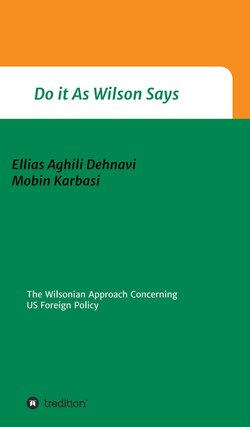Читать книгу Do It As Wilson Says - Ellias Aghili Dehnavi - Страница 7
На сайте Литреса книга снята с продажи.
Оглавление1 .Introduction
There are four traditions in US foreign policy that overlap, reinforce, and sometimes contradict each other in a relationship: the tradition of Hamiltonism, which pursues national interests and economics wisely; The tradition of Jeffersonism, which focuses on the repeated use of force, coercion, and self-help, and another group, which portrays democracy as a shining beacon for others; and finally, Wilsonism, which is idealistic and considers democracy to build a safe world. Each of these traditions has its own unique characteristics; Hamiltonism is cautious, and its realism causes it to ignore moral attractions. Jacksonism is strong and hard, and this isusse will lead to a lack of cooperation with others due to the strong emphasis on power. Thus, it can be said that Hamiltonianism and Jacksonism are inefficient in soft power; while Jeffersonium, on the other hand, has a lot of soft power and not enough hard power. Wilsonism has been able to be largely moderate (largely soft power and little hard power). While Hamiltonianism and Jeffersonism are cautious and conservative in foreign policy, the Wilsonians sought an opportunity to turn it into an international situation.
The focus of the present study is on the Wilsonian approach considering American foreign policy. Woodrow Wilson declared in 1919 that we were setting up this country to free the captives from the hands and feet of human beings, and do not limit this goal to the borders of the United States. Today, however, decision-makers play a key role in the foreign policy process; but it should not be assumed that national goals and interests arise from the minds of policymakers without preamble and are implemented in the form of specific policies and orientations. In many cases, these decisions are the result of values and beliefs, historical and cultural contexts, domestic needs, and the structure of the international system, based on which they provide reasons and justifications for policy makers to make decisions and set goals. Finally, it identifies a set of variables that can be used to evaluate one's own behavior as well as the actions of others. Accordingly, the study of the foreign policy of countries and great powers should be done according to the political traditions, values, concepts and broad meanings of the culture of liberalism in those countries. Liberal ideas are the source of liberal foreign policy, and this is the difference point between the foreign policy of liberal democracies and other non-liberal governments. This study examines the question of what are the foundations of Wilsonism in American foreign policy and what effect has it had on US foreign policy? In order to study and answer the question, first, Wilsonism in American foreign policy is explained and then the impact of this approach on American foreign policy is examined.
